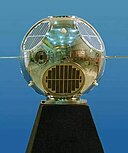Template:Did you know nominations/Galactic Radiation and Background
Appearance
- The following is an archived discussion of the DYK nomination of the article below. Please do not modify this page. Subsequent comments should be made on the appropriate discussion page (such as this nomination's talk page, the article's talk page or Wikipedia talk:Did you know), unless there is consensus to re-open the discussion at this page. No further edits should be made to this page.
The result was: promoted by Amkgp (talk) 13:26, 8 January 2021 (UTC)
| DYK toolbox |
|---|
Galactic Radiation and Background
- ... that Galactic Radiation and Background (GRAB) (1960–2) was the first United States orbital surveillance program, revolutionizing American understanding of Soviet air defense radar capabilities? [1]Source: "You are strongly encouraged to quote the source text supporting each hook" (and [link] the source, or cite it briefly without using citation templates)
- ALT1:... that ...? Source: "You are strongly encouraged to quote the source text supporting each hook" (and [link] the source, or cite it briefly without using citation templates)
Improved to Good Article status by Neopeius (talk). Self-nominated at 17:15, 15 December 2020 (UTC).
| General: Article is new enough and long enough |
|---|
| Policy: Article is sourced, neutral, and free of copyright problems |
|---|
|
| Hook: Hook has been verified by provided inline citation |
|---|
|
| QPQ: Done. |
Overall: ![]() @Neopeius: Nice work on bringing this to GA. In checking for copyright violations, I did not consider the email exchange brought up the copyright violation detector. That is not a reliable source and looks like it's copying from us. Epicgenius (talk) 19:08, 17 December 2020 (UTC)
@Neopeius: Nice work on bringing this to GA. In checking for copyright violations, I did not consider the email exchange brought up the copyright violation detector. That is not a reliable source and looks like it's copying from us. Epicgenius (talk) 19:08, 17 December 2020 (UTC)
@Epicgenius: Haha. I'm famous! :) Thank you very much. --Neopeius (talk) 20:09, 17 December 2020 (UTC)
References
- ^ LePage, Andrew. "Vintage Micro: The First ELINT Satellites". Retrieved January 18, 2019.

